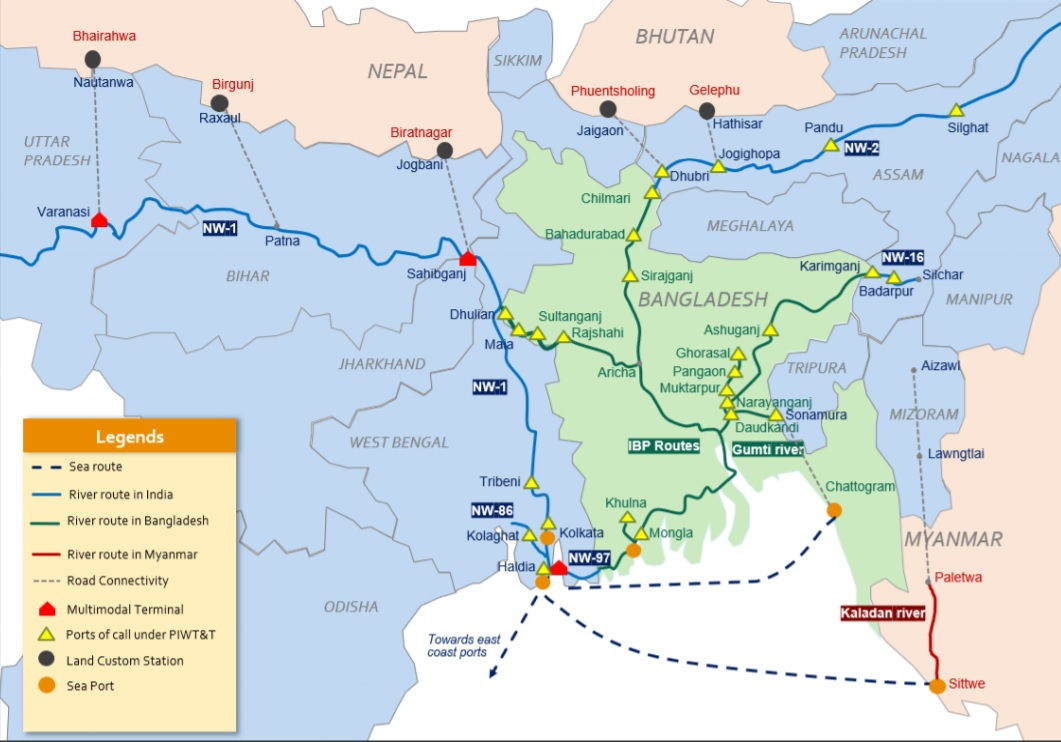With the Narendra Modi government keen to develop the waterway connectivity with its neighbours, India, Bhutan, Nepal, and Bangladesh are working together to strengthen waterways as the mode of intra-regional transport. The push will not only boost trade activity between the South Asian countries but also open doors to the geostrategic Southeast Asian waters.
The move is a further amplification of India's Act East Policy, which focuses on New Delhi's outreach towards its eastern maritime neighbours, especially the 10 nation ASEAN and island territories with a large Indian diaspora.
Specifically, through its Act East policy, India has in the recent years focused consistently on the development and prosperity of the North Eastern states by improving connectivity, access and facilities to the region. This includes various initiatives like connecting the North East Region with Bangladesh, improving access to North East from Myanmar to facilitate tourism and cross border connectivity, promotion of Land Border Crossing Agreement and Integrated Check Post at Moreh and infrastructure projects like India-Myanmar-Thailand trilateral highway, Kaladan Multi Modal Transit Transport Project (KMMTTP) in Myanmar.
While the Myanmar project is stuck for years, India has strengthened relations with countries in the extended neighbourhood to the east through ASEAN-India Plan of Action.
At the same time, India has embarked on developing 'Eastern Grid' inland waterway – a system of multi-modally interconnected waterways and coastal routes – to kick start regional integration in the South Asian Region (SAR) and to facilitate regional trade between South and East Asia.
"India and Bangladesh in particular are taking lead in advancing policies and investments in developing potential inland waterways. A mandatory clause for the movement of certain commodities through waterways as a commodity-based approach will lead to a big boost to inland waterways," Amita Prasad, Chairperson of the Inland Waterways Authority of India (IWAI) told a virtual conference on 'Eastern Waterway Grid for Regional Connectivity,' organized by The Associated Chambers of Commerce and Industry of India (ASSOCHAM) on Monday.
Prasad also spoke of exploring the scope for cruising activity to offer cultural connectivity with these countries, saying that the sector also offers opportunities for business for private players in terms of navigational aids, terminal development, etc.
Officials from India, Bhutan, Nepal, and Bangladesh also participated in the webinar.
"India is an important development partner for Bangladesh. Regional connectivity is our top priority," commented Monemul Haque, Joint Secretary from Bangladesh's Ministry of Shipping.
Bangladesh has been the largest recipient of Lines of Credit (LOC) funds from India having received more than USD 8 billion as the government undertook several projects to enhance connectivity with the North East Region through the neighbouring country.
There are 19 National Waterways (NWs) providing hinterland connectivity to the states of Assam, Nagaland, Tripura, Manipur, Mizoram and Arunachal Pradesh, also connecting these states with mainland India through Indo-Bangladesh Protocol route. North Eastern waterways also hold significant importance in terms of enhanced trade and commerce across Nepal, Bangladesh, Bhutan and ASEAN countries.
"It helps quicker shipment and interconnectivity. Waterway transport is especially important in landlocked countries like Nepal and Bhutan," said Prakash Dahal, Joint Secretary of Nepal's Bilateral and Regional Trade Division, yesterday.
Karma Tshering, Secretary, Economic Affairs, Government of Bhutan added that regional waterways will be a catalyst for development. "The cost of waterway transport is one-fifth of the road and will benefit all countries," he said.

In July 2019, Jitendra Singh, the Minister in charge of Development of North Eastern Region (DoNER), had told Parliament that India had also disbursed around US $ 1.04 billion in grant projects besides extending concessional loans of US $ 478.9 million from India’s LOC amount of around US $750 million to Myanmar.
This funding was for connectivity infrastructure projects like KMMTTP, upgradation of 69 bridges and building the Kalewa Yargi road segment on the Trilateral Highway.
The 1360 km long India-Myanmar-Thailand Trilateral Highway is an initiative pertaining to India, Myanmar and Thailand. India is undertaking construction of two sections of the Trilateral Highway in Myanmar namely, construction of 120.74 km Kalewa-Yagyi road section, and construction of 69 bridges along with the approach road on the 149.70 km Tamu-Kyigone-Kalewa (TKK) road section.
Meanwhile, India continues to strengthen the connectivity with Bangladesh. It was during the visit of Bangladesh Prime Minister Sheikh Hasina to India in October 2019 that the Standard Operating Procedures (SOPs) for the use of Chattogram and Mongla ports for movement of goods to and from India, were concluded.
It is expected that the bond will only grow stronger when PM Modi visits Dhaka next month to participate in the celebrations marking 50 years of Bangladesh's independence and the establishment of diplomatic ties between both the countries.




















